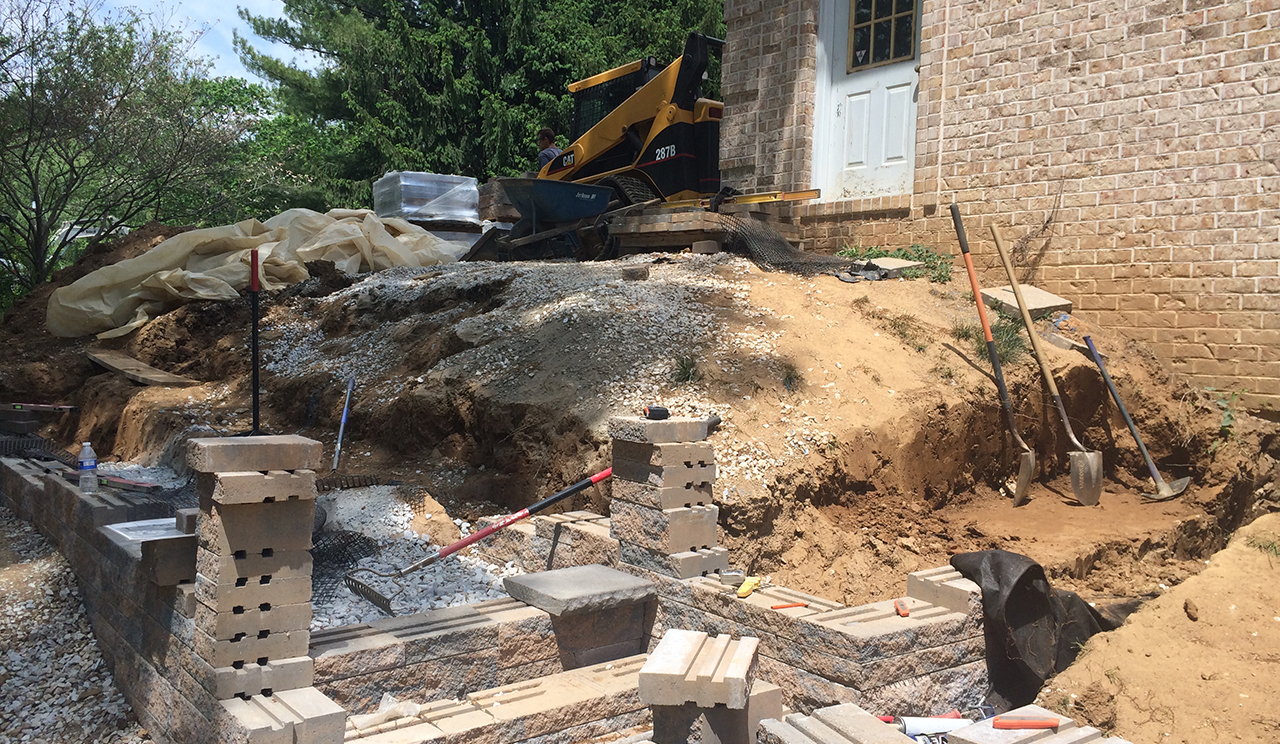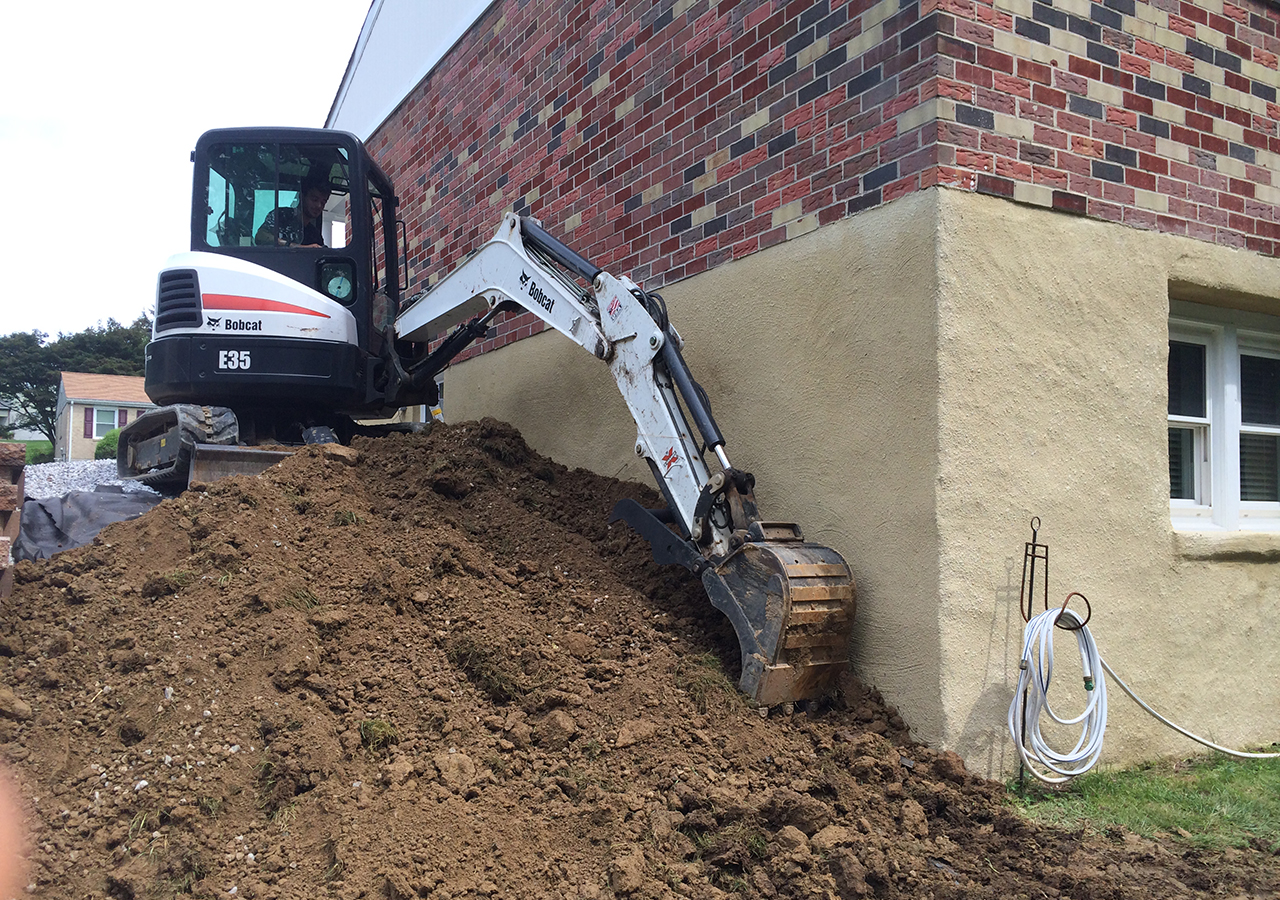Excavating
Types of Residential and Commercial Excavating
Excavating is an important part of outdoor construction and contracting, both for residential and commercial properties. In residential projects, excavation equipment is typically brought in if the contractors are building a foundation, creating a basement, or installing underground utilities such as water, sewer, or electrical systems.
Landscaping projects like the ones Gibraltar Masonry and Landscaping specializes in typically require smaller-scale excavation, however. In landscaping and hardscaping, excavation equipment is typically used to shape terrain, install irrigation systems, or create garden ponds. Grading, trenching, and removing soil and rock are each specialized demands that require excavating equipment and an experienced operator to complete the job safely.

Types of Excavation Used in Landscape Construction
Landscaping construction relies on various excavation techniques to create functional and aesthetically pleasing outdoor spaces. Grading, for example, is an essential part of this process, a method used to level the ground and ensure proper drainage for lawns, patios, and driveways.
Trenching is another technique that is essential for installing irrigation systems, electrical lines, and drainage pipes. It is essential that these lines are precisely dug so the utilities can be laid correctly.
Cut and fill excavation is another technique that involves removing soil from higher areas and filling lower places to achieve a desired landscape contour. This is more common in commercial excavation than it is in residential, though it may be done on a smaller scale with some residential work as well, particularly if the design includes any terracing.
Rock excavation is also often necessary, particularly in this area of the country. The mountainous areas of Maryland and southern Pennsylvania have rocky terrain, and this is a common way to make the land suitable for landscaping.

Topsoil excavation can also assist in landscaping, removing the nutrient-rich upper layer of soil for reuse at another place in the garden.
Every method of excavation serves a specific purpose in your hardscaping and landscaping project. Let Gibraltar Masonry and Landscaping help you create the space of your dreams, bringing your vision to reality. Give us a call today to learn more about our excavating process and how we can help you.
What Should You Look for in an Excavating Contractor?

The success of your construction project, no matter how intensive it is, starts with choosing the right contractor for the job. First, you should look for a contractor that is well-known in the area and has extensive experience with the project you are looking for. If this project includes excavation – as many hardscaping and landscaping projects do – you will want to make sure the company provides that service in house, as subcontracting excavation work can be costly and add additional time to the project timeline.
When hiring a contractor for your initial project, check their credentials as well. You want to make sure they are properly licensed and insured, protecting you from liability in the case of accidents on the property. This is a part of any standard due diligence process for hiring any type of contractor.
If you will need excavating, it also helps to check the contractor’s equipment as well. Specialized machinery may be required for the excavating work, so check with your contractor to confirm they have this equipment available to them.
A good contractor should always provide a detailed estimate and timeline, demonstrating their transparent communication and professionalism. A contractor who listens to your needs and keeps you informed throughout the project is an essential part of achieving results that you can be proud of.
What Does an Excavation Contractor Do?
An excavation contractor is responsible for preparing sites for construction by moving earth, rock, and other materials around the landscape. At Gibraltar Masonry and Landscaping, we perform a range of tasks during excavation work such as digging foundations, grading land, trenching for utility installations, and creating drainage systems.
\We use a range of specialized machinery, as well as common equipment like excavators, bulldozers, and backhoes. Excavation work plays an essential role in ensuring your construction is properly prepared, stable, and ready for building. Each piece of machinery allows us to work efficiently and safely, helping create the outdoor living space of your dreams.
Demolition Services
Demolition services are a common part of excavating and large-scale construction projects, but in landscaping services, it is not as common or necessary. These services involve safe and systematic dismantling of structures to make way for new additions or changes to the space. By tearing down the structure and clearing the debris, it gives the space a new life as new projects can begin with a clean and well-prepared site.
Leftover Dirt Removal
Leftover dirt removal is an essential part of the clean-up process that sures the site is ready for the next phase of a project. After excavation or landscaping work, excess soil must be transported off-site to prevent obstructions and maintain the overall visual appeal of the space. Dirt removal requires the proper equipment and expertise to ensure that the removal process goes smoothly, and it follows local regulations. By clearing away leftover dirt, it facilitates a seamless transition to new construction activities.
Tree & Stump Removal
Tree and stump removal services are an essential part of preparing the land for additional landscaping or hardscaping services. These services involve cutting down unwanted or hazardous trees and grinding – or in this case, excavating – the stumps to ensure the leftover trunk does not obstruct future development.
At Gibraltar Masonry and Landscaping, we use specialized equipment to safely and efficiently remove trees and stumps, minimizing damage to the surrounding area. This process not only enhances the aesthetics of your property, but it can also prevent issues with foundations or underground utilities by removing the roots that are prone to migrating and, over time, cracking stonework.
Grading and Water Management
Grading and water management are both critical aspects of site preparation for any landscaping work. Propre grading involves levelling and shaping the land to ensure water drainage is handled correctly and flows away from structures. This process creates a stable foundation for buildings, driveways, gardens, patios, and other types of landscaping or hardscaping work.
Effective water management includes designing slopes and installing drainage systems to channel water away from critical areas and prevent flooding. This is important for maintaining the integrity of a property and protecting it from water damage, especially if the rest of the landscape will be altered during the process of hardscaping or landscaping.
Retaining Walls
Retaining walls are designed to hold back soil and prevent erosion. These walls are commonly used in landscaping and construction to create level areas on sloped terrain, or terraces, which can help increase the usable area of the property. Retaining walls can also be used to create garden beds and walkways, utilizing materials such as concrete, stone, or wood.
Proper design and construction of retaining walls is essential to ensure the wall remains stable and durable throughout time. Design considerations for retaining walls go beyond the aesthetics and also consider essential functional aspects, such as drainage solutions that manage water pressure behind the wall, and calculating the density and width of the wall based on the amount of soil it holds.
Navigating the Permitting Process
When working on any construction or renovation project, it is essential to rely on your professional contracting team to navigate the permitting process. This is one of the main benefits of hiring a professional to help with the work, as our experienced contractors at Gibraltar Masonry and Landscaping have a dedicated team for handling permits and building codes throughout Maryland and southern Pennsylvania.
Not only do we know which permits to apply for, but we also prepare the necessary documentation and address any concerns officials raise about the project. After submitting the permit application, it goes into review and must be posted on the job site until the project is complete.
Working with an experienced contractor team minimizes any legal risk and ensures your project proceeds smoothly and with fewer expenses. We’re here to help every step of the way.

Choose Gibraltar Masonry and Landscaping
As a trusted stone and brick mason in the Baltimore region, we’ve built our reputation on skill, precision, process, and technique. Working with us provides you with a detailed service that helps your property shine, no matter what it requires to get it there.
